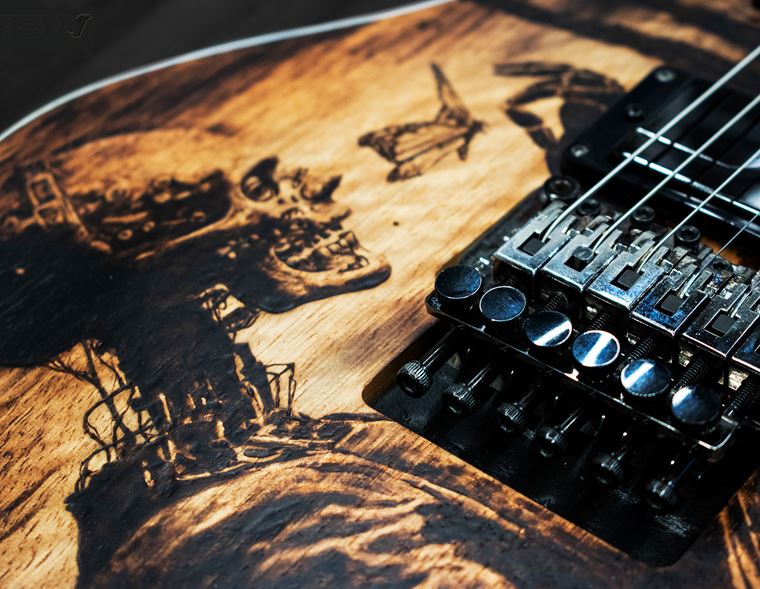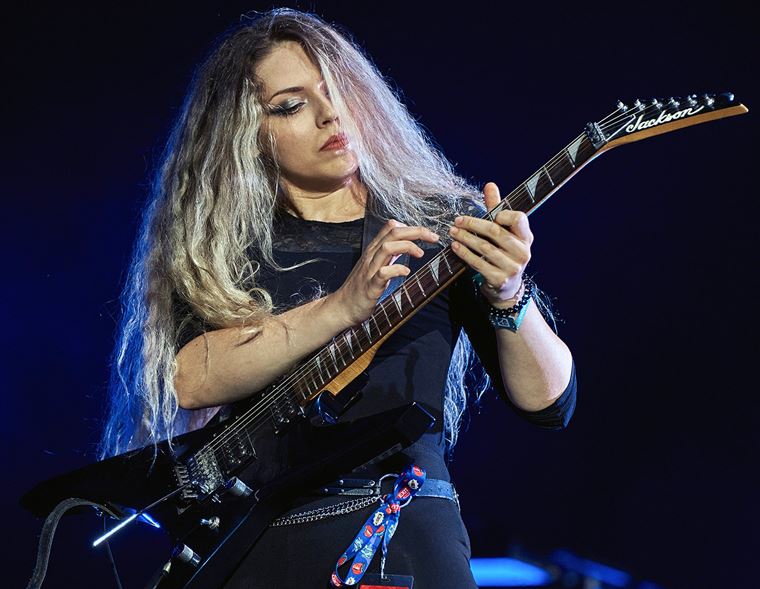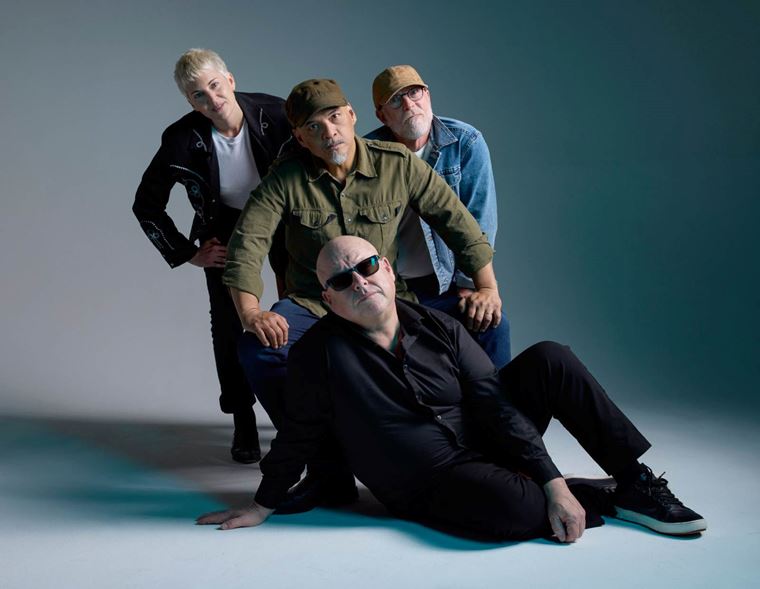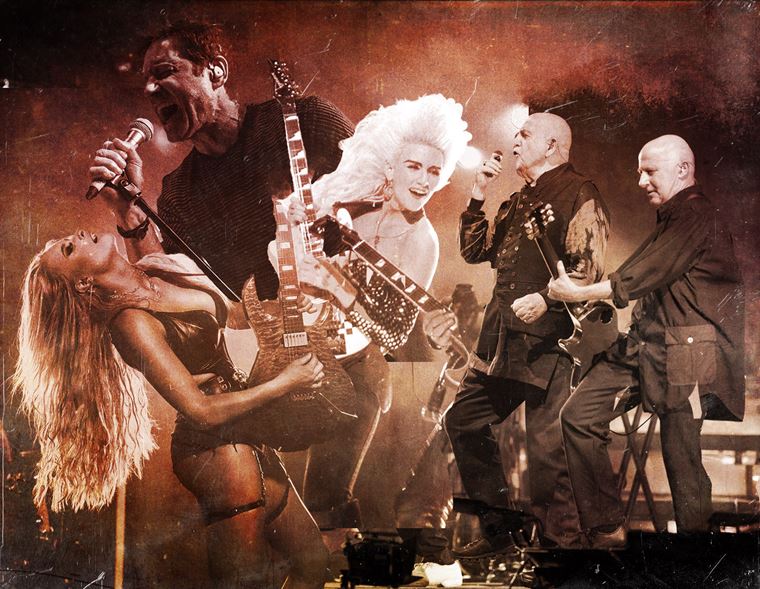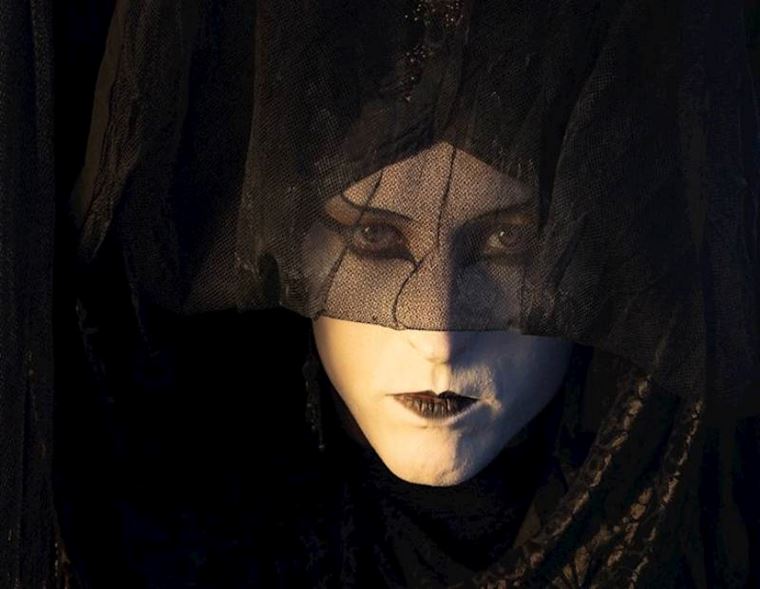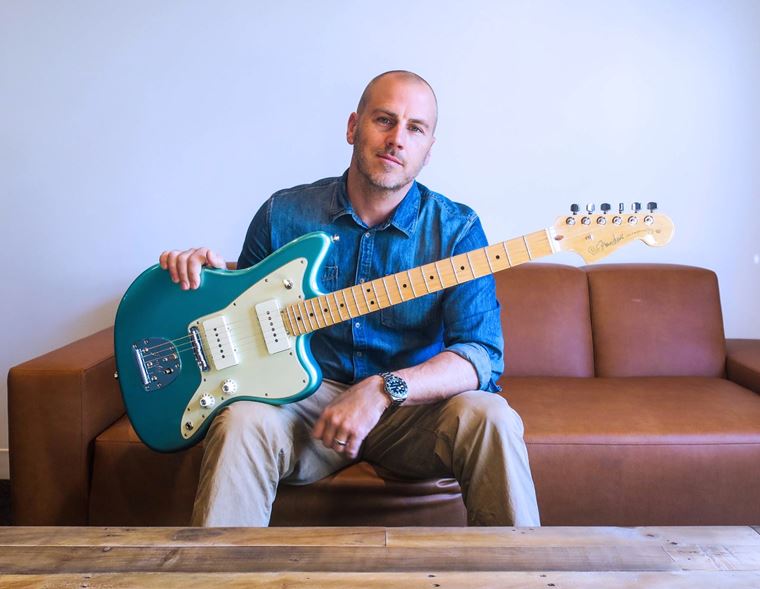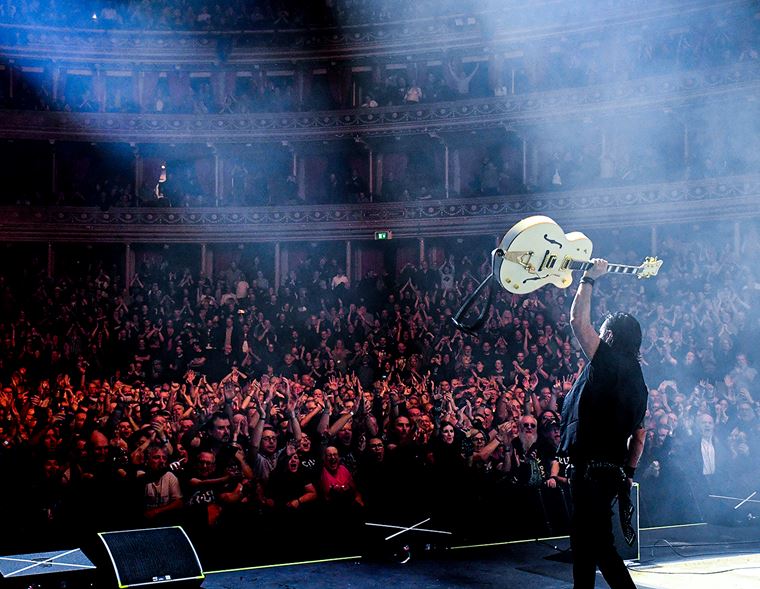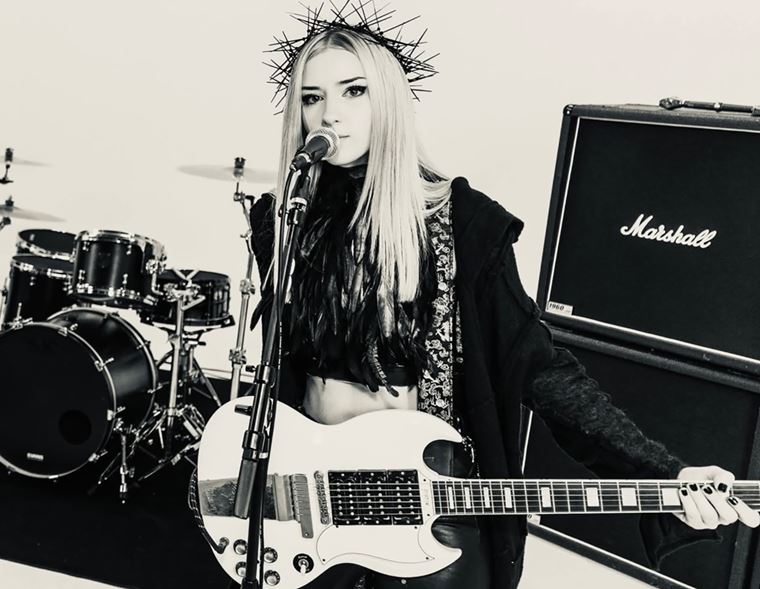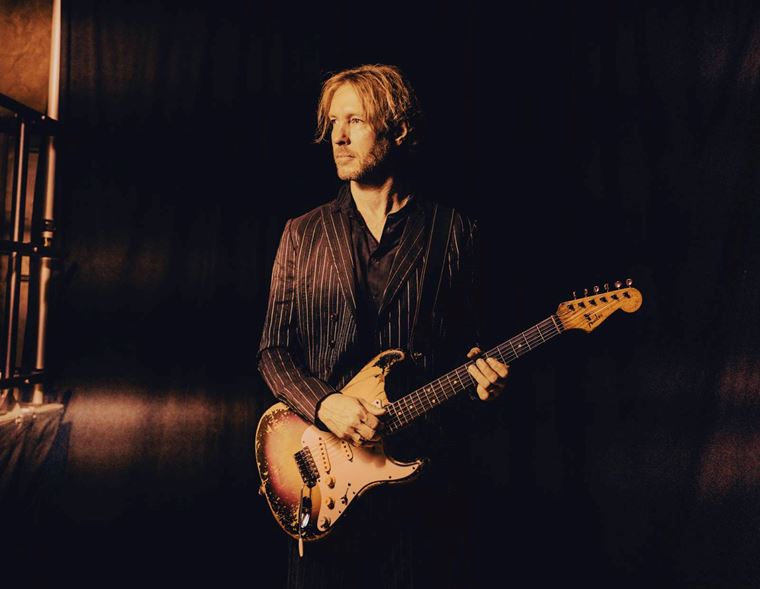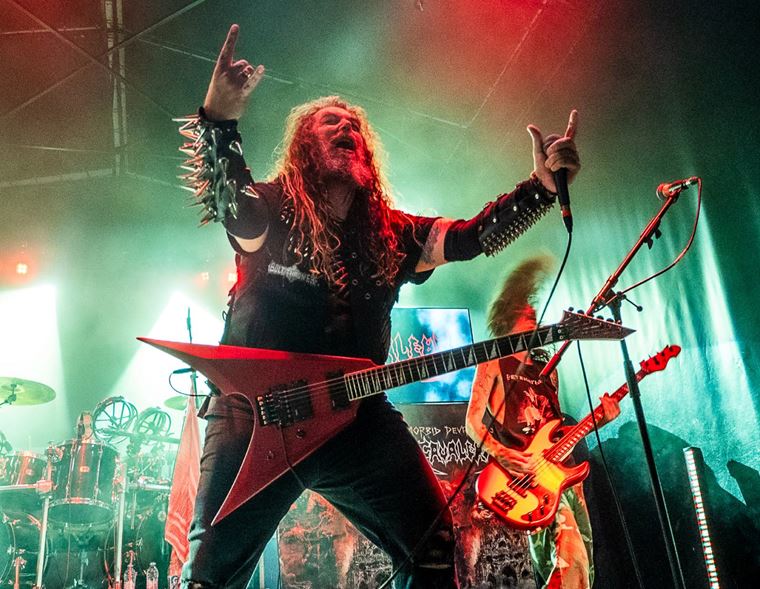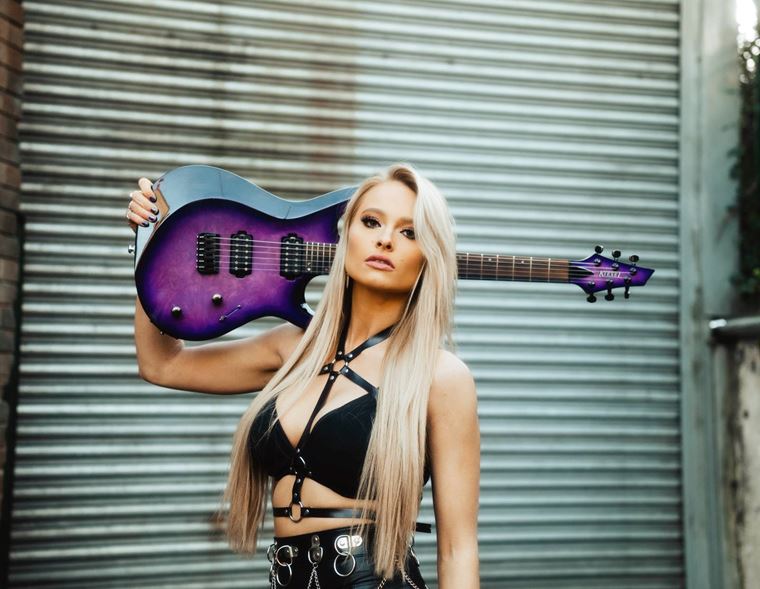Drab Majesty: Deb Demure talks EXCLUSIVELY about An Object in Motion, Channelling, Chorus Pedals & Oregon!
Drab Majesty are one of those bands who create an entire world around their music. Using sound, costume, theatre and references to some rather arcane groups of people, the band pulls you into their world. Artful, oblique and accessible all at once, Drab Majesty bring glamour and mystery to their corner of the world, without ever forgetting to write awesome ear worms with endless hooks and large helpings of 80s-style guitar.
A new EP is imminent, and we wanted to know more about this elusive and mysterious band. Reaching out, we were able to enjoy a Zoom call with vocalist/guitarist and primary songwriter Deb Demure to talk about it all. We learned about the writing trip to the Oregon coast, we dug into particulars about how the beautiful Drab Majesty sound is created, and we even delved into the genesis of the band’s look, sound and ethos. We chatted about flipping guitars, finding retro Yamahas in Mexico City, and the finer merits of pitch-shifting and chorus effects! We found Deb to be relaxed, kind, funny and welcoming of all of our enquiries. It was a real pleasure for us, and you can catch up on it all right here! Read on for the full conversation…
Interview with Deb Demure
guitarguitar: So, I’m a big fan of Drab Majesty, and I love the new EP! It’s kind of a departure from what we’ve had from you already and it’s quite in fitting with my hopes and expectations for new stuff, too. It’s enough ‘different’ and enough ‘the same’, if you get me?
Deb Demure: Yeha, absolutely. I actually thought it would be more different than most people are recognising, so I’m glad. You know, when you’re on the other side of things, you don’t have the perspective of the listener, ever. I’m in the engine space and all I can see is the engine: I can’t really see what the car necessarily looks like, or how it drives. I guess no matter what anyone does in their art, the viewer will be able to connect the threads to the previous works more, I think, than the artist can. They’re gonna leave their thumbprint on anything, no matter what. The thread is easier to tie, with previous works, for the listener. I can take comfort in that, knowing that taking this kind of stylistic jump isn’t really much of a jump at all.
But I do think it is a logical progression, actually. Kinda harvesting the early 90s, what was left there and going to those tones and seeing what can be done with them in the present day.
GG: Crucially, though, it’s without it all sounding like it’s an exercise in retrospective anthologising: it definitely sounds like you’ve taken some notes from back then but this sounds like it’s from 2023.
DD: Great! Yeah, that’s the point! I mean, my philosophy is that these great decades and genres of music have not fully been exhausted and there’s some amazing terrain still to forage into. That should be celebrated again and also done so in an updated manner, locating it in the present day. I never understood the idea that music as a general trajectory needs to change, decade to decade. It doesn’t make sense to me: I don’t think ten years is nearly enough to exhaust some of these incredible movements in music. I see it as just various branches on a tree, and they are still going and still growing. There’s no reason to put them to rest as a collective.
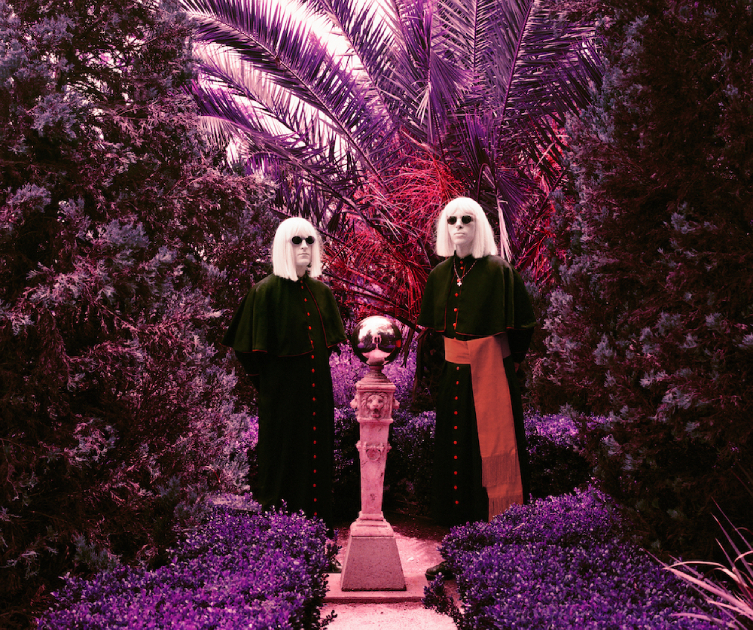
GG: Certainly, and as you said earlier, there’s always this fingerprint of the artist. However much you might like a My Bloody Valentine tune from 1992 or some Baggy song, it’s not them playing it: it’s you with your filter, your taste and what you want out of it, so it’s always going to be different.
DD: Precisely, yes.
GG: The record I’m most familiar with is A Demonstration, and I didn’t know that it was a concept record about the Heaven’s Gate cult until I went looking for it all online. It could quite easily have passed me by as just a collection of cool songs, and after I found that out, it deepened the experience for me. That’s true also of your early stuff, with the Unarian cult and so on…
DD: Mm, yeah.
GG: Is there a similar thing going on with the music you’re creating right now?
DD: You know what? To be perfectly honest, this has become more of an autobiographical kind of material. There’s not really a kind of external event or group of people who are acting as a metaphor, or some kind of starting point. I think the word is, yeah, definitely going more ‘inward’, but to be totally honest, the new (as yet unreleased) LP, I don’t have many lyrics for so I still don’t know the general direction.
But as far as this EP goes, yeah, it’s more self-reflective, um, and steering away from those kinds of themes, at least for the moment.
"If something emotive comes to an acoustic guitar, afterward, no matter where you go from there - however many effects you put on it and however many instruments you add or change - you will have something special."
GG: OK, and reading the notes that we get sent across, you decamped from Los Angeles to a small town in Oregon?
DD: Yeah, Yachats.
GG: Yeah! So, you went up there to be elsewhere while writing, which is always a good idea. I wondered, did you go there with a selection of half-written songs to work on? Or was the idea to go out there and see what happens?
DD: There was nothing written! That Ovation guitar I’ve been playing, I just had that and I’d only just had it reversed to be left-handed. I had my favourite pieces of rack equipment, various pedals and other instruments and I brought that out there with just the idea of making some kind of ethereal music. Something a little bit more related back to nature, not necessarily totally beat driven. The landscape lends itself to that: it’s dense, wooded forests next to a beautiful, expansive cliffside beach. It’s very foggy and rainy as well, at least in April when I went to write this music. So yeah, it was purely the guitar, the equipment, the landscape and the isolation, because there’s no cellphone service whatsoever. There was no preconceived ideas or demos that I’d made in Los Angeles here, which I think is cool, going with a blank slate.
GG: Yeah, yeah! That’s really significant. And that idea of the town itself: it can’t help but play its part in the music, right? Just being there must change how you’re approaching things, compared to when you’re in, say, Santa Monica or somewhere like that.
DD: Yeah, absolutely. Absolutely. I mean, wherever I am, I feel I am reacting to the distractions and the lack of distractions in that space, in that moment. Sometimes, like when I wrote (previous album) Modern Mirror, in Athens Greece, a lot of that was reacting to the chaos of the city. And also not having any command of the Greek language, having space to think and not really hear my voice for many days unless I was just ordering something from a restaurant or occasionally hanging out with a friend. But most of the time, it was spent in a very loud city with, like, personal solitude. That generates a certain thing and so I think yeah, the nature experience lends itself to something really unique, and its own sound, really. At least, when I hear the music, I can hear the naturescape that I was immersed in.
GG: Yeah, that’s interesting. So this work is informed by solitude, but the busyness of Greece had its own sense of solitude since you were disconnected by a language. What I get from probably all of Drab Majesty’s music is a feeling of…well, I’ve written it down here as ‘mystical melancholia’. There’s an eeriness to it all, and I wonder how much of that is deliberate? Like, the world that you want to create, because it comes through in the stuff you made in Greece, and it comes through this stuff from Oregon: it’s always there.
DD: Yeah, because it’s channelled from a higher source, totally. I’m still the vehicle for something else; some other force that’s dictating - truly - the decisions that I’m making in the moment. I’ve talked about this in other interviews, but I still to this day have no fundamental understanding of the guitar neck and of harmonic theory. I’ve kind of leaned into that and it’s worked in so many ways - to my disadvantage and my advantage - but the guitar becomes this sort of divining rod, you know? I’m just reacting in the moment to impulses that I believe I channel from a source that’s far beyond me. I like to stay in touch and commune with that source and it’s that impulse that drives me to create certain creative decisions harmonically and melodically. In the real space when I make the work, I’m actually finalising those decisions and determining how to utilise them, but yeah, there’s still this kind of spiritual assistance that I very much believe in and still have a very strong connection with.
GG: That’s incredible! I’d like to talk some more about that, if it’s easy enough? Do you have any particular practises that you do prior to sitting down with the intention of allowing - let’s say the spark - to come through? Anything that can encourage that sort of situation to occur?
DD: Yeah, well I mean first of all, to really optimise it, the space by which I’m working in needs to be completely clean and in order. Not to an obsessive-compulsive level but there has to be no visual noise or mess or anything around the domain I’m working in. So that’s super-important. There can’t be any overwhelming smells or distractions like that. I personally like to work after some slight physical exercise where my body is relaxing after I've gotten some initial burst of energy out. Lighting is super important, just kinda everything you would imagine to harness creativity, nothing too unique. Usually I have a small meditation beforehand as well, maybe fifteen to twenty minutes, but I think mainly, there can be no phones nearby, the space has to be completely clean and of course, the tone! Sometimes just an acoustic guitar can generate, and I used to like to write on an acoustic guitar primarily, because if something emotive comes to an acoustic guitar, afterward, no matter where you go from there - however many effects you put on it and however many instruments you add or change - you will have something powerful.
Lately, I’ve tried to find ‘the sound’, or a sound that really inspires me, and then that also becomes the fuel for getting an idea out. Just entering into that kind of meditative space where I’m entranced by the tone, you know? It’s all about the tone, man! (laughs)
"It's channelled from a higher source, totally. I'm still the vehicle for something else; some other force that's dictating - truly - the decisions that I'm making in the moment."
GG: It’s all about the tone! And that nicely dovetails into us discussing your Ovation! It’s a somewhat unusual choice for a guitar, not for any particular reason other than people haven’t been using Ovations for a while and I always associate Drab Majesty with Strat-type guitars. How did the Ovation show up in your life?
DD: Quite simple, I was in the market for an acoustic 12-string. I have been a longtime Marty Willson-Piper fan, of The Church. I love his playing, his acoustic 12-string stuff, and I was just kinda looking around. One of my best friends, a producer we were working with called Ben Greenberg from the band Uniform, he said, ‘Takamines are cool but you should check out the Ovations’. I was like, ‘Okay!’ I hadn’t really heard of the guitars: I recall seeing them and thought that they were kinda goofy years ago but I never really looked into the tonal qualities.
We were kinda concepting this particular guitar sound that involved not really a micing technique on the Ovation but actually using its pickup and running the pickup through the Eventide Harmonizer. That, with a particular micro-pitch reverb setting, which we’ve used before and become particularly obsessed with. We thought, let’s try running the Ovation through that. I have a Harmonizer at home, and when I tried it out, you have the 12-string, the chorusing and the harmonised micro-pitch doing its thing, it has its own static chorusing. Then we had a light slapback reverb on it, and it becomes this three dimensional, glassy sound. Then if you put a mic on the front of the Ovation, just like an SM7 or something over the soundhole, it’s a cool tone.
So that became the basis for when we re-recorded everything back in Brooklyn, after I brought over everything I’d written in Yachats.
GG: Excellent! It’s a beautiful sound, without being overtly separate from the beautiful jangly tones we know from you already. Here’s one for you: when I’m playing along to Drab Majesty, it seems to me that some of the songs are deceptively difficult to play. I’m thinking you must adopt some unusual tunings, right? And if so, how does that relate to the 12-string?
DD: Yeah, so I have a pretty idiosyncratic style of playing and yeah, if you try to figure out any Drab Majesty songs in standard tuning, good fucking luck! (laughs) And some people have! I commend them for it, it’s incredible. I have probably seven to ten different tunings that I’ve used over the years but as far as the 12-string goes, I believe it was all standard - or Eb standard - and I made one alteration (Deb asked us to refrain from divulging the tunings here, since they are secret! Ray).
Here’s the thing: the way I come up with the tunings is, I’m playing different parts and then I’m finding shapes and wondering, like ‘Okay, I want this to be an open string’ because it’s all about the open strings and open tunings, and having them droning at least around what’s happening with the bass strings. So, I’m tailoring that as I’m working, and I actually don’t remember what the tunings were! I know they weren’t completely standard on the new EP.
On the other stuff, there’s dropped strings all over the place, capos…it’s a pretty interesting project. But with the tunings, the shapes are not that hard, really, it’s the fingerpicking patterns: they are really weird and they don’t follow any typical scheme or pattern. They change quite often. Yeah, it’s almost like a kind of classical guitar approach.
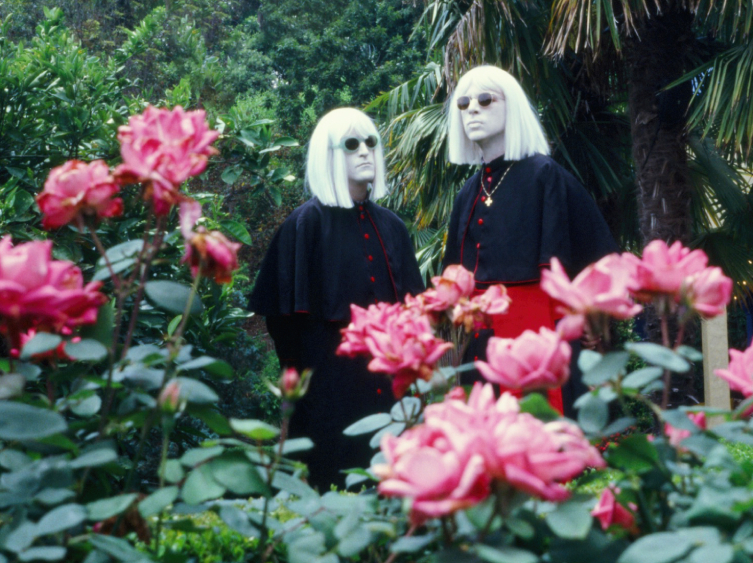
GG: Uh-huh, I know what you mean. The good news is, a lot of your arpeggios are quite melodic, so if it sounds like your fretting hands are in the right position, then you can kinda feel it out by going with the melody. So, what made you decide to go fingerstyle exclusively?
DD: I was playing drums in a band with a girl called Emma Ruth Rundle, are you familiar with her work?
GG: I saw her performing only last year, in fact!
DD: Oh, you did? Oh, cool! She’s one of my best friends and I love her dearly. She was kind of the impetus for me to start playing fingerstyle guitar. She also played fingerstyle in this band, Marriages, and I dunno, I was just really impressed with how much she was getting done as just one guitarist. I always loved 80s guitar arpeggios: Johnny Marr stuff, Andy Summers. So this was around 2009, 2010, and I never heard anybody in my age group playing guitar like that. Slowly, I got into Robbie Basho, Nick Drake, and John Fahey, some of these folk guys. I picked up an acoustic and taught myself, with Emma’s assistance by proxy - she wasn’t really schooling me. She has this really unique approach to fingerpicks, and actually not using traditional fingerpicks but going to the drug store and buying these plastic press-on nails then she would put on and file into shape. I’d never seen anyone do that, so I in turn adopted that technique and I still go and buy the same nails ten years later.
GG: I didn’t realise you wore fake nails! So, you file them, yeah?
DD: Yeah!
GG: That explains why you have such a nice, sharp sound! Otherwise, the flesh of your thumb and so on would give a darken tone, right?
DD: Yeah, it’s thumb, my first finger and my middle finger. It’s my claw, the tripod that I use. I think Emma also uses her ring finger, which I know many people also do.
"When you go to a show, you're attending with your ears but you're also attending with your eyes. It's important to give someone something visual when they're showing up and standing in a room watching you play."
GG: I do things the same way as you actually, but I’m a traitor: I’m a lefty who plays right-handed.
DD: Oh, ok! Haha! That’s okay.
GG: I’m sorry.
DD: No, lucky you! You can actually buy a guitar that you want!
GG: I can have a choice of colours and everything!
DD: Yeah! I’m constantly flipping guitars upside down! It’s cool, because sometimes you get really interesting shit with the scaling of the low E string, since it’s where the high E’s supposed to be. It becomes, I dunno, ten centimetres longer or something than it would, and I kinda like that. Sometimes the pickups are inverted, and weird things like that: some guitars sound better when you flip them and some sound worse. I love all my instruments for sure but the ones are really special to me are the ones I’ve found that are left-handed, like a weird orphan guitar that, I dunno, it’s just special.
They’re also more fuckin’ expensive, which I’ve never understood! Is it the scarcity of a guitar that makes it more expensive?
GG: Scarcity is certainly a factor. I think it’s even the quote-unquote 'hassle' of having to stop the manufacturing process in order to flip around all the machinery or whatever.
DD: Yeah, yeah!
Guitar Talk
GG: So it goes. But let’s talk about some of your guitars! I made a comment earlier about how I’d seen you playing Stratocasters and what look to me like Yamaha Pacificas. Do you have any particular favourites?
DD: Yeah, I do! I mean, stuff I’ve used on recordings isn’t necessarily stuff that makes it on the road. I have some reservations about taking precious vintage instruments on the road, but yeah, my first guitar was actually a Christmas present that I got when I was six years old, in 1993. It was a 1992 Fender Duosonic. I played it for maybe a year or two and then just dropped the guitar and wanted nothing to do with it. I hooked up with the drums and didn’t return to the guitar until I was 23 years old or something like that, 24. I kept that guitar the whole time and that became the first guitar for the Drab Majesty sound: all of the first recordings were made with that guitar. It’s quite cool, I have some Seymour Duncan Antiquity pickups in it that sound really nice, and it’s got this really shiny, gothy sound, it’s a short scale and it’s its own thing. I wanna bring it back out for the next record. It’s just got a really unique chimey sound.
I think I put 13s on it, which is insane! It sounds crazy because it’s a short scale with super heavy gauge strings. I dunno what I did that, but it sounds really cool!
"I think there's something interesting when you combine kind of playful or strange imagery with very serious subject matter: you get this equation that becomes something really impactful."
And then the Yamaha Pacifica was through the generous people at Yamaha guitars. I’ve always liked Yamaha guitars but I’d never really considered the Pacifica. I had a Strat, just a regular modern day Strat with Lollar pickups in it - it’s a lefty too - and it was given to me generously by the Fender people and it sounds great. The Pacifica was a bit more of a custom job, it also has Lollar high output pickups and yeah, it’s cool. It’s got an ebony fretboard and it sounds really plucky and chimey. Some guitars just really lend themselves to the fingerstyle thing - I use the bridge pickup on both of these - and they both really translate the arpeggios nicely, but I’m still trying to figure out what the next sound will be.
Actually, speaking of Yamaha, I did acquire something that I’m absolutely in love with recently at a thrift store in Mexico City. Drab Majesty had just toured Mexico and we had a couple of days off. It was maybe an hour before my flight and I walked past one of the few music thrifty stores in Mexico City. I looked up and saw on the wall this 1968 Yamaha SG-3C, the banana guitar. Are you familiar with those?
GG: I am! Now that is a very Drab Majesty looking guitar, haha!
DD: Yeah, right? Absolutely! I just said ‘oh my god’: I immediately magnetised to this instrument. For a start, it’s orange, which is pretty cool, like a bright reddish orange. It’s a crazy colour, It’s got a whammy bar on it, which is interesting but it’s inactive. It was right-handed of course, so I had it flipped over and now I think the shape of it looks so much cooler when it’s flipped upside down! Because the guitar looks quite phallic (laughs) when it’s held the right way but now it kind of bends over and looks more like a teardrop or something like that. I think it looks cooler left-handed, so I’m looking forward to playing this guitar a lot more, actually. It sounds insane!
GG: That sounds like a Drab Majesty signature guitar just waiting to happen, doesn’t it?
DD: It really is, yeah! (laughs) I’m going to do some recording with a friend today, so I’m bringing it. I’m developing a really cool relationship with this instrument.
GG: So good! And of course, a big part of your sound is the way you use effects. I’m presuming you have lots of chorus and reverb, but do you have any particular favourites? People can get really picky about chorus pedals, like particular versions of a Boss Dimension pedal and so on.
DD: Oh man, yeah. I mean, I’m not picky in the sense that, like, I think all chorus pedals have their place but yeah, the one I like personally is the Dimension C. I’ve used it on pretty much everything. That thing is just, there’s something about it that’s truly it’s own thing. I maybe have fifteen chorus pedals (laughs) and that one, for whatever reason, always wins. It always wins. I love the Ibanez DS505, that’s an 18v stereo chorus and that’s also really cool and has an interesting distortion on it. But yeah, lately I’ve been more into the micropitch thing, where it’s less of a moving thing - there’s no LFO - it’s just, you know, doubling the signal and pitching it down a few cents. Yeah. I don’t use reverb, though.
GG: Oh, interesting! I would’ve thought the opposite! Why do you choose not to use reverb?
DD: Um, I use it on other things but on guitar, I’ve never had a reverb pedal in my chain. It's’ more about having multiple delays smacking up against each other and then kind of exploding. A short delay fed into a long delay kind of creates the illusion of reverb but it doesn’t take up the sonic space of a reverb. I’ve always been really partial to the ping-pong delay, which is how I’ve split my signal. The ping-pong thing is the last thing in my chain, and those go to two separate amps, and it’s tap tempo as well. You’re getting this stereo spread of the short delay with both amps pin-ponging between each other. The long delay comes before, and that’s mono so that goes into the stereo ping pong delay, and that’s how you get this expansive reverb sound but it’s not reverb.
GG: Yeah, it keeps your notes front-and-centre as well as giving you the ambience.
DD: Exactly! Yeah. Precisely.
GG: So what about amps then?
DD: So, I take a dry output from the Dimension and it goes to a Princeton for my dry sound. What continues out of the Dimension C goes into the time-based effects. I don't really consider chorus a time-based effect: some people, I guess, do but that’s still part of the quote-unquote dry signal.
"I maybe have fifteen chorus pedals and the Dimension C, for whatever reason, always wins. It always wins."
GG: Yeah.
DD: Those end up culminating into two Jazz Choruses.
GG: Cool! In terms of live performance, whenever I’ve seen Drab Majesty, it’s been the two of you. Presumably Alex looks after a lot of the keyboards and presumably the drum patterns. I’m wondering about this new stuff where you have moments in songs like the Skin in the Glove where there’s a very specific bass guitar part: I’m not sure if that would work on a synth, right? How are you gonna do this stuff live?
DD: Ah! Great question! I have no idea. (laughs) We’re figuring it out. The bass was done by the super-talented Justin Meldal-Johnson, who plays with St Vincent, Back and Air. M83 he’s worked with. He’s super competent and it’s his bass playing. I know he probably wouldn’t come on tour with us - as much as he’s said in the past that he’d like to - I don’t think we can afford him. But someone needs to be able to step up and do that work. It’ll be interesting to see what happens with that. We’ll figure it out though! (laughs)
GG: So, just to round things off, I have two questions that kind of relate to each other. It’s about the more visual aspect and presentation of Drab Majesty. When you started off in Los Angeles, that city has something like ten thousand active bands. I’m thinking: how did you go about getting people to take notice of you? You obviously make effective use of costume and so on. Was that relating to standing out as a band as much as representing those kinds of received energies you mentioned earlier?
DD: In terms of the weird relationship with the muse or the higher source, listening back to the music felt like some sort of out of body experience. I didn’t feel like my own personal identity as Andrew was necessarily represented in the music at all. There's definitely consideration for theatrics and the fact that you go to a show, yeah, you’re attending with your ears because it’s a music show, but you’re also attending with your eyes. It’s important to give someone something visual when they’re showing up and standing in a room watching you play. If it’s just a band standing in the clothes they came in from work, and its just the house lights, then that band has to be really fucking good and captivating in some way to hold my attention! Because I don’t even need to look at it, I could be standing anywhere. There could be a black cloth over the whole thing (laughs).
So that was an important consideration, and then as far as the building of the personas, we pulled from a lot of various sources and inspirations. A lot was to do with Hollywood public access figures and various UFO cult stuff like that, you know? Initially it was something that was not totally serious - because we are not totally serious people - but then that became part of the art, because all of my favourite art in the past has not taken itself totally seriously but has had its serious message. I think there’s something interesting when you combine kind of playful or strange imagery with very serious subject matter. You get this equation that becomes something really impactful. Obviously there’s a lot of art that’s serious through and through, and it’s like ‘holy shit that’s powerful’, but I do like to ride the line between the sacred and the strange. That’s where the magic happens.
What a fascinating conversation! Deb did not disappoint. We’re very thankful to Deb for giving up their time and being so accommodating. We can’t wait for 25th August, when An Object in Motion by Drab Majesty is released on Dias Records.
Visit the official Drab Majesty page on the Dias Records site, and go to the Drab Majesty bandcamp for all of your vinyl & merch needs!


